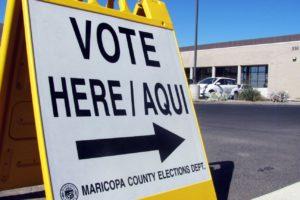
This is a busy time of year at the Arizona State Capitol. Most years, legislators are attempting to finish all of their work, most notably the annual budget, in order to call and end to the session and be done for the year. This year’s legislative session will be a significantly longer one, with Governor Katie Hobbs and the Republican-led legislature sure to have significant battles over the budget and legislative priorities.
One additional dynamic involved Republicans attempting to navigate around the veto pen of Governor Hobbs and enact legislation, and one way that they can do so is to put a bill on the ballot for a public vote. Understanding that election reform is a highly partisan issue that has no chance of overriding a veto, Republicans devised HCR2056, a reform bill that passed the House along partisan lines in the House and is likely to do the same in the Senate, and as such will be on the ballot in November.
Unlike previous attempts at election reform however, this bill is not steeped in conspiracy theories or bad faith; it does appear to be a genuine attempt to speed up reporting results. Any follower of Arizona’s elections knows that final results often take at least a week, and this bill would ostensibly produce final results significantly more quickly by requiring that ballots be returned to voting centers by the Friday before election day and mandating on-site tabulation with identification.
That said, the on-site tabulation aspect is clearly more easily said than done, and quite predictably, most of the individual county recorders have come out in force against it, as well as Secretary of State Adrian Fontes. Fontes’s statement was appropriately measured, calling for clarification instead of rejecting the concept outright. The statements from a few Democrat County Recorders were less measured, harkening back to the intense polarization of the issue, as if any improvement of elections is necessarily an attack on our elections.
While the language likely needs better specification and clarification before it heads to the ballot, on its surface it seems to be a reasonable ask of our elections system. Considering our current importance as a swing state, waiting a full week to get accurate results should no longer be considered the acceptable norm. When both the White House and control of the US Senate may come down to our state, too much is on the line for such extended certainty. Is this the perfect answer? Probably not, but a move that goes in the right direction is still a move in the right direction.
When Republicans in the legislature come up with fixes for our elections, it’s easy to be cynical. For too long they have used it purely as a partisan battering ram, or as a toy with which they aim to cater to the whims of the former President. But we shouldn’t reflexively throw the baby out with the bathwater, since our elections do have issues and we should aim to resolve them. This is a reasonable move towards that aim, and we shouldn’t let partisanship get in the way.

